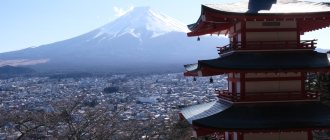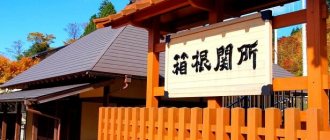One day I had a very sobering experience. I took a group of tourists from Indonesia to a popular restaurant in Yurakucho where you can eat steak at a very affordable price. That evening the area near this station was very crowded, with many foreign tourists and office workers. The waiters did not pay attention to us - perhaps they were very busy. If so, we took the nearest available seats. We also did this because there was a man among us who could not walk. I waved my hand and raised my voice, but the waiters gave us only a fleeting glance, and no one came to take our order. When a young waiter was nearby, I called out to him, and he said: “Who gave you permission to sit here? You can’t sit down without asking!” - and when I translated this to the guests, they were amazed and immediately left the restaurant: “We will never come here again!” - they were indignant. At the same time, we also saw Japanese who sat down without an invitation - it was obvious that foreigners who clearly did not speak Japanese were not very welcome here.
Two faces of Japan: how foreign tourists see it
Last fall, the author of this article twice accompanied groups of tourists from Indonesia on a trip to Japan. One group of seven people traveled along the Osaka-Kyoto-Nagoya-Tokyo route, and the other, of three people, visited Tokyo, Hakone and Chiba. Both groups consisted of important government officials and deputies; in Indonesia they are known, but in Japan, where they are not known, they could just travel like ordinary tourists. On their way, they met different Japanese people - both wonderful people filled with the spirit of omotenashi hospitality, and disgusting ones who cannot stand foreigners. How do the Japanese really treat foreigners? I could not hide my confusion as I tried to answer this question to the people I accompanied as translator and guide.
At an upscale hotel in Kyoto, fluent Japanese-speaking foreign employees, including Filipinos, Chinese, and Indonesians, serve guests from different countries, and they were as hospitable as the Japanese employees. At the same time, when the group that I accompanied stayed at this hotel, the guests liked some of the accessories in the room, and at about 10 pm I went to the counter to ask if it was possible to purchase it. There was a young Japanese behind the counter, who immediately snapped: “We have never had such guests before, nothing will work out.” I asked him several times, but he was relentless: “The manager is not there at this time,” “If they answer, it will be tomorrow.” And we left the hotel early in the morning.
I didn’t have time, I was in a hurry, but then someone from the authorities appeared and politely said: “I see, I’ll find out if it’s possible to buy it, wait in your room, please.” After half an hour of waiting in the room, we were informed that the item could be purchased at cost, and they named the price. An acquaintance of mine who worked as a manager at the renowned Imperial Hotel in Bali used to say: “Whenever and whatever the guest asks for, if you cannot fulfill the request right away, ask him to wait and look for the best way to satisfy him. This is the basis of service." Looks like they forgot the basics at that hotel in Kyoto.
On the other hand, the Okura Hotel in Tokyo has not tarnished its name as one of the best; the service there was at an excellent level. When booking rooms, they check the guests' names in their visitor history records and already knew that these were important people in Indonesia. They tried to ensure that no one below the manager came into view, and the placement in the rooms, the observance of the staff, the attention to the guests - everything was wonderful, everything was organized so as not to offend visitors. They showed the highest skill in service and tried to do everything in their power for the guests, whoever they were.
Japanese lessons: welcome guests with soul!
The famous Japanese hospitality, that same OMOTENASHI, has captivated more than one million guests of this country. It makes no difference between a client and a guest, even the word used for both is the same, OKYAKUSAMA - something like “His Majesty the guest.”
Today, the Japanese rarely visit each other, preferring to meet on the neutral territory of restaurants or parks. This makes the rare trip to someone's home even more exciting for both parties. If you happen to be on the receiving end, then fortunately for you, there are words that help the guest feel that he is welcome here.
TV presenter Crystal Takigawa promises a warm welcome to guests of the 2021 Olympics in Tokyo
So, first you need to thank the guest for taking the time and physical effort to get to your place. We value this highly, so we add OHAKOBI to the standard YOKOSO (“welcome”). HAKOBU, “to carry,” in this case shows that the guest, having spent time and effort, finally brought his precious lower limbs to you. There are no limits to Japanese politeness, so depending on the degree to which you need to elevate your interlocutor, we raise the degree of exaltation: YOKOSO NO OHAKOBI, ATSUKU OREI MOSIAGEMAS (ようこそのお運び、厚く御礼申し上げます).
Next, you need to assure the guest that you were really waiting for him: OMACHI SITE IMASHITA. The words are simple, but the person is pleased. We push through respect, we get OMATI MOSIAGETE ORIMASHITA (お待ち申し上げておりました).
But how long can you bow in the corridor? We invite the guest to go inside: OAGARI KUDASAI. In Japanese houses, the hallway and the dressing room are necessarily separated by a step, so you literally invite the person to “go up”, どうぞお上がりください.
どうぞお上がりください
Even after three heartfelt phrases, your sensitive Japanese guest is still somewhat tense, so you need to invite him to make himself at home: GO-YURURI TO. This phrase combines the meaning of the words YUKKURI and YUTTARI - the first means that there is nowhere to rush, the second - that you shouldn’t limit yourself in space either. However, your Japanese friend, accustomed to occupying as little territory as possible for personal use, will most likely still huddle on the edge of the sofa. Oh well. We tried: どうぞごゆるりと.
It's time to feed the guest. It’s clear that in such an exciting situation a piece won’t just go down your throat, so we continue to relax the guest: O-KOKORO OKI NAKU. Don't be shy, please. The usual GO-ENRYO NAKU with approximately the same meaning is less suitable here, because the concept of ENRYO (遠慮) in Japanese is a virtue and carries a positive meaning. It is unlikely that you will relax the guest by inviting him to get rid of his aesthetically beautiful embarrassment and become insolent. We can’t make a guest blush, so we use the safer お心置きなくお召し上がりください (O-KOKORO OKI NAKU OMESHIAGARI KUDASAI).
It’s not a fact that the borscht you served from real beets will be to the taste of the guest, so we immediately disclaim responsibility: O-KUTI NI AIMAS KA DO KA... I’m not sure that you’ll like it, but that’s what they eat here. Honestly. お口に合いますかどうか…
ほんのお口汚しですが…
If you didn’t get the chance to buy a pot of borscht, but decided to save money on your guest and served only cookies, then you should apologize for such a small amount of food: HON-NO OKUCHI YOGOSHI DES GA. YOGOSHI (汚し) means “to dirty”, but in this case this does not mean that you served the guest pure guano or, God forgive me, natto. お口汚し means that the guest’s stomach will not be satisfied with your treat, but will slightly stain his mouth.
As soon as the meal begins, the Japanese will exhale automatically, so you no longer need further guidance. As a farewell, you can ask the guest to come see you again if he happens to be in your area: MATA DZEHI OTACHIYORI KUDASAI! And if your communication was really pleasant and sincere, then hugging goodbye is exactly the case when the manifestation of your overseas barbaric manners most likely will not cause any rejection. Be sincere! This is the main thing that the Japanese value in personal relationships - with all the wealth of beautiful external forms.
(Based on materials from the book “Speak beautifully in the words of Yamato” by Takahashi Koji, 2014)
Katya Edge, editor-in-chief of Beautiful Japan (@beaujapancom)
Other articles by the author:
Poems in the Japanese subway: the moon, stars and Sky Tree
Entertaining Japanese: “white face” – is it interesting?
Hakoiri-musume: daughter in a box?
Genuine Hospitality
Nowadays, the Gotemba Puremiamu Autoretto discount store complex, located in the city of Gotemba in the prefecture, is popular among tourists from Indonesia. Shizuoka. Almost every Indonesian who comes to Japan heads to this city, which offers views of Mount Fuji. For this reason, Indonesians work in the store of the famous Yves Saint Laurent brand and others, and halal food is served in restaurants for followers of Islam - with skill and care for customers.
We went to the Italian restaurant Torattoria Tavora in the same center. We walked a lot, were tired, and didn’t look at the menu very carefully, choosing something that didn’t take long to prepare. There were a lot of people, we sat apart, but the workers prepared seats for us so that we could sit together, and in addition, they clarified: “Sorry, the dish you ordered uses pork - what should we do about it?” They saw a group of Indonesians, assumed they might be Muslims, and took care of the customers. My companions expressed gratitude and delight, ordered more expensive dishes, and I ate the pork, so as not to send it to the kitchen, since I am not a Muslim.
Regarding halal, I remember an incredible incident that happened last spring on a JAL plane flying from Jakarta to Narita. The breakfast menu included a bacon omelette, and the Indonesian woman sitting next to her ordered it. It was immediately clear from her hijab that she was religious. She clarified with the flight attendant that it was not pork and started eating. Probably, the taste seemed somehow different to her, and she asked another flight attendant who was passing by. She answered that if it was bacon, then of course it was pork. I was also surprised and asked again, this time in Japanese, and she answered the same thing. Both the woman and other Indonesians around began to be indignant, and I, understanding what was going on, called the chief steward and explained the problem. He replied that he would ask the staff who were in charge of the food on the ground. After that, he apologized and said that it was still beef.
Assuming that the problem existed not only on this plane, I contacted my friend at JAL, who previously worked in the press service. He replied that they checked everything, made sure there was a problem, and would train the staff so that this would not happen again. Flight attendants must have a thorough knowledge of the menu and take care of the needs of passengers, especially on lines where there are many Muslim passengers. This is precisely the original question of hospitality. Their competitor, ANA, has addressed this issue and warns that on lines flying to Jakarta, pork is not on the menu. This, perhaps, is real care and attention to the needs of the client.
Geography of MICE: Japan is a country where hospitality becomes a philosophy
A place of selfless hospitality, helpfulness and long-standing corporate traditions - Japan - became the theme of the ABT-ACTE Russia Educational Seminar “Geography of MICE”, which was held at the Hilton Leningradskaya Hotel in Moscow on September 11.
The first to greet the meeting participants was Deputy Executive Director of ABT-ACTE Russia Ekaterina Alexandrova
.
She introduced the sponsors who made this event possible - the national Japanese carrier Japan Airlines (JAL)
, the tour operator
ART-TOUR
and the company
Business Travel Solution
.
The cleanliness, friendliness, and brightness of the Land of the Rising Sun attracts travelers from all over the world. Tokyo, one of the world's largest cities, was awarded TripAdvisor's 2013 World's Friendliest City Award for its cleanliness, friendly locals, transportation and other services.
According to Junichi Shiraishi
from Japan Airlines (JAL), the secret of Japan’s popularity among foreigners is simple: “omotenashi” (おもてなし), which means “hospitality” in Japanese, hides a whole complex of traditions and rituals inherent in the national character of its inhabitants. This is a kind of packaging art transferred to service. For example, one of its manifestations is considered to be Japanese cuisine, the use of oshibori (wet towels served before meals).
“Omotenashi” is always based on the principle of “kizuki” (気づき), that is, care and consideration for the possible wishes of the client, including those with disabilities. By the way, special attention is paid to creating a comfortable barrier-free environment in Japan. In particular, JAL airline offers special seats on board for disabled people. Thanks to "kizuki", the passenger can also choose food at his discretion - either European or Japanese cuisine.
“In our country, they treat the client with great trepidation and often say: “Treasure every meeting, because it will never be repeated,” the expert added and wished the participants to listen to their partners and do everything possible to make each of them feel welcome. - truly happy.
Yulia Borisova
, Southeast Asia Country Manager, highlighted some of Japan's MICE routes that may be of interest specifically to business travelers.
• “Culinary Adventures” (Tokyo - Kamakura - Yokohama). Travelers are invited to appreciate the variety of traditional Japanese cuisine, because it is not only fish, but also meat and vegetarian dishes.
• “Golden Triangle” (Tokyo - Kyoto - Hakone). For those who want to learn the history of Japan, as well as get acquainted with the natural hot springs in Hakone.
• “The Way of the Samurai” (Tokyo - Kamakura - Nikko). A program for sports fans, primarily sumo.
• “Three Dragons” (Tokyo - Osaka - Okinawa) and “To the Origins” (Tokyo - Shirakawa - Matsumoto - Nagano). These programs are popular during tourist seasons; they allow you to get acquainted with Japanese beaches (which came as a surprise to many seminar participants) and see cherry blossoms and maples.
The first part of the seminar ended with a master class on teaching the art of origami and Japanese packaging, which was conducted by the supervisor of the reservation and sales department of JAL airline Akiko Kato
.
After the break, Ms. Kato's colleague Margarita Kalabashkina
spoke about the advantages of the Japanese carrier’s offers. There are currently four flights a week from Moscow to Tokyo, but thanks to JAL's partnership programs, a business traveler can easily reach Japan any day. Flights are carried out by a comfortable Boeing-787 Dreamliner airliner with ultra-modern technical equipment and a range of services. The average ticket price is 650 €.
There are two large airports in Tokyo - Haneda (or "Tokyo International Airport") and Narita, which is 90 km away from the center of the Japanese capital. The air harbor connects public and rail transport.
If travelers need to travel to a city outside the greater Tokyo area, they can take advantage of JAL's nationwide Japan Rail Pass. In fact, having purchased a company air ticket in Moscow, a traveler has the right to travel to any Japanese city using any available transport.
The JAL loyalty program, among other things, includes free use of Wi-Fi throughout Japan and includes all flights carried by passengers on Oneworld airlines, as well as Emirates and Air France. When you reach 10 thousand miles, you can get a coupon equivalent to 12 thousand yen ($120).
Daria Zueva, in turn, spoke about the features of Japanese hotels
, Marketing Director of Business Travel Solution. The expert lived in Japan for about ten years. According to her, services in hotels of international chains are much more expensive than in non-chain ones. Moreover, local hotels have a specific atmosphere, where the main thing is the desire to save space and restraint.
Among the most famous MICE venues, Ms. Zueva singled out Tokyo Big Sight - the Tokyo International Exhibition Center, opened in 1996, and the Tokyo City View observation tower. The 17th-century Kanga-an Temple in Kyoto recently opened its doors and can also host corporate events for up to 50 people. You can try plant-based Japanese cuisine (sushi, sashimi, etc.) here in Kyoto.
Among the hotels, the speaker noted Hills Tokyo, Shibuya, which is often chosen by fashion designers to host their shows.
During the discussion, experts also advised meeting organizers to take into account national holidays when planning a business trip, since many Japanese prefer to go on excursions to the capital and other large cities on these days. Inna Rukhadze
(Accenture) spoke about a new trend in the hospitality industry when families invite foreign guests to a traditional Japanese lunch or dinner.
At the final part of the Educational Seminar program, a prize drawing took place from partners of ABT-ACTE Russia. The Weekends.Travel company gave the lottery winner a travel certificate worth 300 €.
“This is not the first time I have participated in ABT-ACTE Russia events and I never cease to be amazed - there is always something new,” Tamara Budnik
. “I would like to thank the speakers for their very interesting and fascinating reports.”
Press service of ABT-ACTE Russia
Hospitality with constant attention to detail
Transport Minister Keiichi Ishii announced that 24 million foreign tourists visited Japan in 2021. The government has set a target of 40 million foreign tourists by 2020, when the Tokyo Olympics and Paralympics will be held. It is planned to use “home hotels”, inscriptions in English will be put on road signs, more understandable symbols will be introduced on maps, visa requirements will be relaxed - thus, work is constantly underway to prepare for receiving guests - the system for their reception is changing, facilities and equipment are being created.
However, the Indonesians with whom I spoke said that they understand the inevitability of some inconveniences when visiting another country, that is, Japan, but if something is not clear, the Japanese will cordially explain, somehow they will be able to explain themselves in English, and they even like. That is, tourists traveling to Japan expect a completely ordinary attitude from the Japanese. As I accompanied them on their trips, I reflected that the basis of hospitality is caring for people.
Relevant products in the Online store:
Clinique
Clinique For Men Set Dryness
RUB 1,499
limited edition sale
Clinique
Clinique iD™ Active concentrate that tightens pores and evens out skin texture (must be supplemented with base)
732 rub. 1,220 rub.
Clinique
Clinique iD™ BB-Gel Moisturizing BB gel, correcting skin tone in travel format
RUB 1,404 RUB 2,340
Clinique
Clinique iD™ Active concentrate against signs of fatigue on the face (must be supplemented with a base)
732 rub. 1,220 rub.
All goods
The need to take into account the specifics of the country and religion of the guest
I once accompanied a group of Indonesians to the Osu shopping district in Nagoya. In the Kawaetsu Women's Products store, women were choosing clothes, and an elderly saleswoman, seeing that we were tired of walking, settled us on chairs and suggested that we rest quietly before moving on. “You don’t have to buy anything,” she said, asked what country the guests came from, and when she learned that they were from Indonesia, she asked if it was hot there and talked to them cordially. Thanks to such friendly treatment, the shopping trip became even more enjoyable.
There in Nagoya, when a group from the Indonesian Ministry of Transport visited the aircraft on which the Japanese MRJ passenger aircraft was being built, a young Japanese employee appeared at the briefing and said: “Before the war, Mitsubishi built those same Zero fighters, they were excellent fighters.” , but, unfortunately, we lost the war.” The translator omitted the words “unfortunately” in the translation, but did this Japanese really not know that in World War II there were battles in Indonesia and many people died? When he was reproached for speaking too incorrectly, he became embarrassed and said that he himself felt that he was saying something wrong, but did not apologize or justify himself to the Indonesians.
People from Indonesia, which is considered friendly to Japan, from Thailand, where there are many devout Buddhists, from the Philippines, where many people died in the war, tourists from other countries spend their money on expensive trips to Japan, and we Japanese should at least take into account the peculiarities their countries and religions. We should not forget about one of the possible meanings of the word omotenashi, “hospitality” - the absence of a front and back side, that is, straightforwardness.
Banner photo: Aflo
(Article in Japanese published January 19, 2021)
Related materials:
Clinique | Shiseido | Clarins | Clinic | Shiseido | Clarens | hospitality | Guests | traditions | tradition | France | England | Bolivia | Malaysia | Holland | Norway | Japan | Australia | Uzbekistan | Ossetia | China | Austria
Articles
- Morning ritual: 8 rules for beauty and healthy skin January 02, 2016, 00:00
- Fitness: who's new January 14, 2021, 00:00
- Old things: throw away or remake? October 24, 2021, 00:00
Video
- Skin care around the eyes from SHISEIDO May 17, 2010, 00:00
- Makeup in 5 minutes from Clinique July 19, 2011, 10:31
- Summer makeup from Clinique July 26, 2012, 00:00
EXAMPLE OF HOSPITALITY
First, let me express my deep gratitude for the opportunity to participate in an internship on the topic “Tourism”, organized by the Japanese Ministry of Foreign Affairs. Thank you for the opportunity to visit a beautiful country and see it from the inside. I could spend hours talking about how beautiful Japan is. Amazing nature, ancient history, amazingly convenient transport, delicious food - all this makes it possible to develop tourism without extra effort, but the Japanese are not ready to simply use what nature gives them, but systematically, prudently and very correctly increase the number of both incoming and domestic tourists. This is exactly what we wanted to learn during our week of stay,” says O. GUREVICH, Executive Director of JSC Travel Agency “Primorsky Club”
It's no secret that Japan is a role model in the field of hospitality. What is special about guest service and the formation of service in a hotel? What is the secret of Japanese hospitality? Finding answers to these questions became the main goal of my internship in Japan under the “Tourism Business” program,” shares M. LARYUSHINA, training manager of OJSC “Our House Primorye”, structural division “Hotel Management”
Getting ready to write a report about the internship, I was thinking about what to tell. Or rewrite several sheets under the heading “little things” that I wrote down every day, marveling at the interesting details I spied in business, social life, relationships. Or write about visiting hotels, including the Yokohama Bay Sheraton... But none of this will convey the mood that accompanied me in Japan and the aftertaste that pleasantly pleases me now. It's all about how and why you are going for an internship.
How ready are you to perceive a completely different world and transfer it to your life and business here.
Thanks to the Government of Japan and the Ministry of Foreign Affairs for this unique opportunity. Thank you for the opportunity to gain practical knowledge, which was shared like gold by my colleagues - V.E. KOLITENKO, Director of the Equator Group of Companies.
I would especially like to note the competence of the translator Alexey Nikolaev - he knows a surprising amount about the modern history of Japan, and brilliantly - the history of our country. We received a professional, accurate and consistent translation, thanks to which our communication with the Japanese was comfortable and without difficulty,” noted O. SAVCHUK,
Deputy Financial Director of LLC Management Company “Invest”, Petropavlovsk-Kamchatsky.
The purpose of our internship was to obtain and expand knowledge in tourism business in Japan and the use of this knowledge in the course of economic development in Russia. The group consisted of managers and executives of Russian enterprises in Vladivostok, Khabarovsk and Yuzhno-Sakhalinsk, operating in the field of tourism and hotel business, as well as employees responsible for issues in the field of tourism. Number of people in the group – 20. Implementing organization – Japan-Russia Economic Center. The director of the Center, Mr. Yadzima, and Asel Nazarmanbetova, assistant director, did everything possible to ensure that our internship brought us maximum benefit,” recalls O.V. ANDREEVA,
JATM in Vladivostok.
Laryushina M.:
We arrived in Japan late in the evening. We are greeted by friendly Asel, a nice girl, our coordinator. A little tired from the flight, we approach the bus, where the driver is already waiting for us. And from the first minutes of your arrival in another country, you understand that you are welcome. How did I understand this? Here is our driver with a smile on his lips, sincerely greeting each of us in Japanese, bowing low, taking the luggage, lifting it from the ground with his hands (rather than dragging it on wheels) and placing it in the luggage compartment. It would seem - what a trifle. But quality is in the details. Sincerity in the eyes, a greeting phrase (even in an unfamiliar language), a smile, conscientious fulfillment of one’s duties—this is what formed the first impression and accompanied us throughout our entire stay in Japan.
Andreeva O.:
On the second day, the entire group was divided into 2 groups (hotel business and travel companies). I had the opportunity to join the Hospitality group and visit two hotels: Root-in Gotanda Hotel (Tokyo) and Yokohama Bay Sheraton Hotel (Yokohama). Familiarization with the hotel infrastructure, room capacity, inspection of the hotel, obtaining detailed information on hotels from hotel employees.
Laryushina M.:
The second day was devoted to visiting enterprises. Our Hotels subgroup was especially impressed by the Sheraton Hotel. And answering the question why, I realized that the key impression is not the chic interiors and technical equipment, remembering the hotel, mainly, you remember Mr. SODEYAM, the training manager of the hotel, who spent about 2 hours with us. Sincere, positive, friendly, with an excellent sense of humor, and at the same time a great professional - he was able to win us all over so quickly that there was an instant sympathy among all members of our group. Our communication was clearly structured - in a short time we were able to visit the main departments of the hotel: banquet halls, restaurants, a church, several rooms, after which Mr. Sodeyama readily answered all our questions. We were interested in everything without exception: from the level of wages to the formation of a training system at the hotel. It was interesting to know that each new employee comes to work and is trained in the classroom for about 1 month, after which he undergoes an internship for about 3 more months in other departments. In fact, training takes several months, after which the employee is assigned to a specific workplace. Without a doubt, this trip mainly formed a key understanding of Japanese hospitality.
At Mr. Yajima's lecture and at the JNTO (Japan National Tourist Organization), we were presented with statistics on the number of incoming tourists, as well as the breakdown of incoming tourists by country. Mr. Yajima in his lecture explained the structure of the tourism business pyramid, as well as the method for assessing the quality of tourism services provided. This theoretical framework expanded the knowledge accumulated through practice. And the meeting at JNTO showed the readiness of this organization to cooperate with all areas of the Russian tourism business. I hope to take advantage of the acquaintance I have made in the future,” says O. BORISIK, 1st category tourism agent at Primorsky Agency of Aviation Companies OJSC
Laryushina M.:
When visiting JNTO (Japan National Tourism Organization), it was very pleasant to visit one of the centers where you can get not only the necessary information, but also on the 2nd floor to get acquainted with the cultural aspects of the country - put on a kimono, fold origami, try children's games. The center has a very pleasant and inviting atmosphere.
Borisik O.:
It was extremely useful to visit the tourist information center (1st floor of the Tokyo Municipality), where we were told what assistance this center provides to tourists from different countries. Here you can take maps, use the free Internet, get information about events currently taking place in Tokyo, book an excursion, and even book an extremely low-cost excursion with volunteer guides.
Gurevich O.:
we visited the office of Japan's largest tour operator
JTB
, learned about the offers and research of this operator, and shared ideas on how best to attract Russian tourists.
Also, on the second day we were in , we work with this operator, and it was very nice to get to know each other better. We found out and were very interested in his new proposals - Anime tours
, we really hope to gather several groups on this topic in the near future.
Borisik O.:
During a visit to the Akihabara District Tourism Development Association and the Osaka Tourism Bureau, information was received on what measures were being taken to promote a specific area (city).
A competent policy of specially created organizations makes possible the predicted
rapid increase in tourist flow.
Laryushina M.:
The tourism center in the Akihabara area was particularly impressive. After the lecture, we were kindly given a tour of the area. I was especially impressed by the attitude of the guides to their work - professionalism, conscientiousness, positivity. A great end to the day was a visit to the Maid Cafe - a unique place where you can feel the atmosphere of youth pop culture, hospitality and recharge with positive energy. “We are glad to see you again!” - This is a traditional greeting addressed to every guest. And what positive emotions are formed by the sweet rituals that personal waitresses perform with each guest. Before drinking the drink, fold your palms in the shape of a heart and repeat the cherished words of your maid. The feeling of childhood, positive emotions, and a sense of spontaneity did not leave us throughout the entire evening!
Gurevich O.:
I had great pleasure visiting the Tourism Development Association in Akihabara. It's amazing how you can do so much in such a small area. I have prepared a large presentation for the Public Expert Council for the development of tourism in the Primorsky Territory under the Governor and will give a report on how it is necessary to develop and develop a brand of a certain territory using the example of Akihabara. In addition, it was very interesting to visit the visitor centers where we were during our internship - in Tokyo and Osaka. I hope that soon, with our help, similar centers will be created in Vladivostok; we will be happy to share the information obtained during the internship.
Laryushina M.:
We were given a sincerely warm welcome in Osaka. We were all sincerely surprised when, upon exiting the elevator, smiling representatives of the organization were waiting for us with balloons and a “welcome” banner. And Russian flags are attached to the tables. An amazing feeling just covers you in these moments - they are waiting for you, they know about you, they are not indifferent to you. What simple and familiar feelings to all of us that have no nationality. Here it is - an individual approach! Here it is - cordiality! And with it comes a feeling of celebration that will last a lifetime.
Andreeva O.:
Towards the end of the internship, we were given a business meeting with representatives of travel companies specializing in working with Russia. During the meeting, representatives of Russia and Japan managed to get to know each other better, discuss issues and problems that arise during mutual cooperation, and establish new relationships.
Savchuk O.:
The final stage was a business meeting with representatives of travel companies. Everyone had time to meet each other, exchange opinions and contacts. If you value accuracy, consistency and quality in your work, then you will be comfortable working with representatives of Japanese companies. I have never met more punctual, responsible and efficient people in my work. The knowledge gained during the internship is applicable, contacts with the Japanese side can be established for further cooperation. It all depends on everyone’s personal desires. Personally, I did not have enough material from the field of general and financial management, marketing and investment planning in this field of activity.
Gurevich O.:
The business meeting on Friday brought a lot of information. In addition to extremely useful contacts, we learned, for example, that in Japan, in addition to Okinawa, there are also tropical islands, Ogasawara. Amazingly beautiful nature, clear sea and very reasonable prices, we are sure, will attract our tourists there. We received information about what we need to do to ensure that Japanese tourists leave Primorye with greater satisfaction.
Borisik O.:
The unofficial part of the trip was no less significant - getting to know the sights and cuisine of Japan. During my time in Tokyo, I was able to visit the Odaiba area and walk the Rainbow Bridge - a very beautiful bridge! And it offers stunning views of the city! Ride a sightseeing tourist bus without a roof, take a walk in the Roppongi and Shibuya areas. As a result, I debunked the myth about the “high cost” of this country - you can eat very tasty, varied and not at all expensive. Entrance fees to various parks are very cheap, and there are many places with free entry. I would like to express special thanks to the organizers of the internship for the trip to the Hakone region, since for me this excursion allowed me to see Japan from a different side, unexpected for many who imagine Japan purely as a high-tech country of technical progress. But there is also gorgeous nature here, which the locals value and cherish! A visit to this area left a lasting impression, and I will definitely recommend visiting this natural park to all friends, acquaintances and tourists going to Tokyo.
Gurevich O.:
and on the last day a gift awaited us - a trip to Fuji-Hakone Park. It is pointless to talk about the beauty of this area; it is very difficult to describe this beauty. But, as always, we received not only aesthetic pleasure, but also a lot of practically useful information. Fuji-Hakone Park is an ideal tourist cluster, the creation of which is now being talked about a lot in Primorye. Our tourists have the opinion that Japan is a very expensive country. Using our own example, we have seen that many costs, especially transportation, can be reduced, which we will be happy to inform our tourists traveling to Japan about.
Borisik O.:
The main results of the internship for me: expansion of the partner base; deepening knowledge about the country as a whole, as well as about excursion and tourist attractions, which will make it possible in the future to give tourists competent advice on drawing up routes around Japan, methods of traveling around the country, choosing the most convenient accommodation facilities, about “must see” places (which simply cannot be do not visit); significant expansion of the theoretical knowledge base about the formation and promotion of the tourism product.
Laryushina M.:
and the main results for me are that I can formulate a formula for hospitality: Sincerity + Smile + Individual approach + Professionalism. Of course, living conditions also play a huge role. But as time passes, we remember with warmth precisely the fact that you are welcome there, you are remembered, respected, cared for. These are not just memorized greeting phrases. The secret of cordiality is in the person himself, his attitude towards people and the world around him, cordiality and a sincere desire to help and show care, which comes from within a person. And it is very important - love for your work, the desire to do it efficiently, from the heart, 100%. This inspires real respect for the person and the company he represents.
Vladivostok, 2013
Related posts:
- OJT "TOURISM" internship in Japan from November 15 to 26, 2011 December 15, 2011 | Association of TraineesTravel Resources, Travel | NEDBAILOVA Irina Yuryevna, head of the foreign tourist reception department of Fregat Aero LLC: The group consisted of managers and senior staff of tourism business enterprises in the cities of Vladivostok, Khabarovsk, Yuzhno-Sakhalinsk and Petropavlovsk-Kamchatsky. The main part of the program took place in Tokyo and included lectures, seminars and meetings to exchange experiences. On the first day we visited the Japanese Foreign Ministry,
- EFFECTIVE USE OF TOURIST RESOURCES October 10, 2021 |
Association of Trainees | An internship in Japan on the topic “Tourism Business” brought together representatives of the Far Eastern region from September 4 to September 11, 2021. Implementing organization: JTB Corporate Sales Inc. The report of INOUE I.M., executive director of TRM LLC, and SNEGUROVA I.V., executive director of the Center for International Tourism and Education "ITEC", was joined by comments from colleagues of the Vladivostok group of interns. Our team was from - CREDO FOR THE REGION November 24, 2021 | Association of Trainees | Report on the internship in Japan on the topic “Tourism Business” 11.11-20.11.2018 The internship was organized by the largest tour operator in Japan, which is part of the JTB Group, by order of the Japanese Ministry of Foreign Affairs. The JTB holding includes several areas of activity, but tourism is the main one. The history of the company began in 1912 with the creation of a travel agency to work with foreign travelers. Currently the company's interests are represented in
- INTERNSHIP REPORT ON THE TOPIC “TOURIST BUSINESS” December 12, 2009 | Association of TraineesTravel Resources, Travel | 08.11.2009-22.11.2009 More than 2 weeks have passed since our internship ended. We returned to our offices, again - routine work, but as always happens after returning from Japan, being in this truly amazing country spurs you on, gives you impulse and the desire to change something in yourself and in your work. Agree - this is
- EXPLORING TOURISM October 25, 2021 | Association of Trainees | SIDORENKO Alena Aleksandrovna, 4th year student majoring in Tourism at Vladivostok State University of Economics and Service (VGUES). On December 1, 2015, she completed a one-year internship under the exchange program at the Toyama International University. (富山国際大学) E-mail – From October 1, 2015, I completed an internship for two academic semesters at Toyama International University. Toyama (富山市) - central








